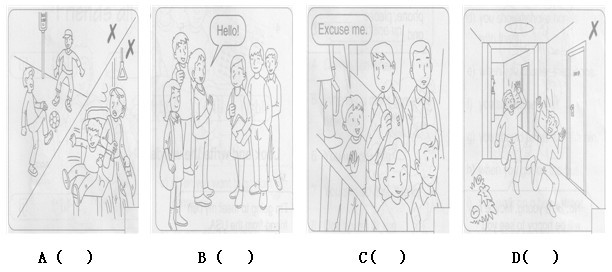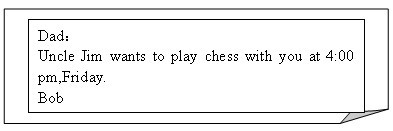2013年小学六年级英语第十二册(第1-2课)形成性测试卷
(考试时间: 60分钟 满分:100分)
命题人 方红玲 审题人 叶向荣
一. 听力部分 (40分)
I. 听录音,将含有所听音素的单词的编号填入括号里。念两遍。(4分)( )1. A. gift B. giraffe C. gravity( )2. A. young B. ground C. famous( )3. A. wrong B. whose C. whole( )4. A. airport B. borrow C. horribleII. 听录音,选择你听到的单词或短语。念两遍(10分)( )1. A. 119 B. 118 C. 120 D. 114( )2. A. put on B. put out C. put in D. put off( )3. A. dangerous B. safety C. carefully D. carelessly( )4. A. get up B. turn on C. get out D. turn off( )5. A. heard B. left C. took D. calledIII. 听录音,根据录音内容给下面图片排序,将编号填在括号内。念两遍(8分) IV.听录音,选择正确的短语完成句子,将标号填在括号里。念两遍(5分)
IV.听录音,选择正确的短语完成句子,将标号填在括号里。念两遍(5分) ( )1. When there’s a fire, we should ________________.( )2. When you are at home, we shouldn’t ________________. ( )3. When you hear the fire alarm, we should ________________.( )4. When we see the smoke, we should ________________.( )5. When the heater is on, we shouldn’t ________________.V.根据录音所给的情景,选择正确的做法。念两遍(7分)( ) 1. A. Sit down on the street. B. Line up and wait. C. Run and push.( ) 2. A. Hug them warmly. B. Wave and say, “Hello.”C. Shake hands with them.( ) 3. A. “Who are you?” B. “Hello!” C. “What do you want?”( ) 4. A. Push people down. B. Run quickly. C. Say, “Excuse me.”( ) 5. A. Wave and say “Hello!” B. Hug and say “Miss you!”C. Shake hands with them.( ) 6. A. “I’m sorry.” B. “Pardon me?” C. “Excuse me!”( ) 7. A. Run to the first seat. B. Let old people sit down first. C. Push people down.VI. 听录音,在横线上填上所缺单词完成句子。念两遍(6分)Kate : Hello, may I__________ to Pat, please?Pat: __________ is Pat. Who‘s __________?Kate: Hello, Pat. This is Kate. How are things__________ on ?Pat: Very good. I am having a good __________ Kate : What should we do when we are in a foreign __________?Pat: When you __________ older people, you should__________ hands with them. When you answer the__________ ,you should say '__________ '. When the family isn‘t at__________. you should take a__________.听力地址:
( )1. When there’s a fire, we should ________________.( )2. When you are at home, we shouldn’t ________________. ( )3. When you hear the fire alarm, we should ________________.( )4. When we see the smoke, we should ________________.( )5. When the heater is on, we shouldn’t ________________.V.根据录音所给的情景,选择正确的做法。念两遍(7分)( ) 1. A. Sit down on the street. B. Line up and wait. C. Run and push.( ) 2. A. Hug them warmly. B. Wave and say, “Hello.”C. Shake hands with them.( ) 3. A. “Who are you?” B. “Hello!” C. “What do you want?”( ) 4. A. Push people down. B. Run quickly. C. Say, “Excuse me.”( ) 5. A. Wave and say “Hello!” B. Hug and say “Miss you!”C. Shake hands with them.( ) 6. A. “I’m sorry.” B. “Pardon me?” C. “Excuse me!”( ) 7. A. Run to the first seat. B. Let old people sit down first. C. Push people down.VI. 听录音,在横线上填上所缺单词完成句子。念两遍(6分)Kate : Hello, may I__________ to Pat, please?Pat: __________ is Pat. Who‘s __________?Kate: Hello, Pat. This is Kate. How are things__________ on ?Pat: Very good. I am having a good __________ Kate : What should we do when we are in a foreign __________?Pat: When you __________ older people, you should__________ hands with them. When you answer the__________ ,you should say '__________ '. When the family isn‘t at__________. you should take a__________.听力地址:2013年小学六年级英语第十二册(第1-2课)形成性训练卷听力MP3
笔试部分 (60分)


